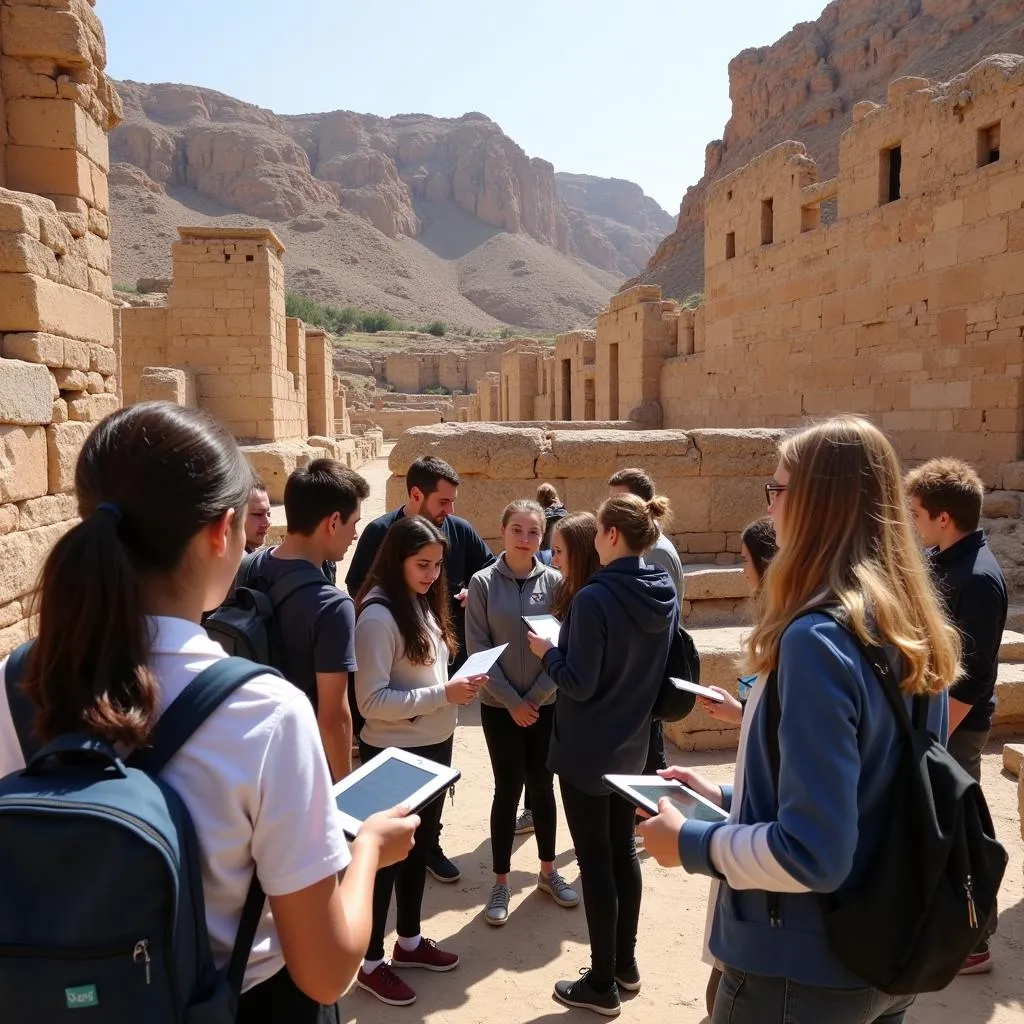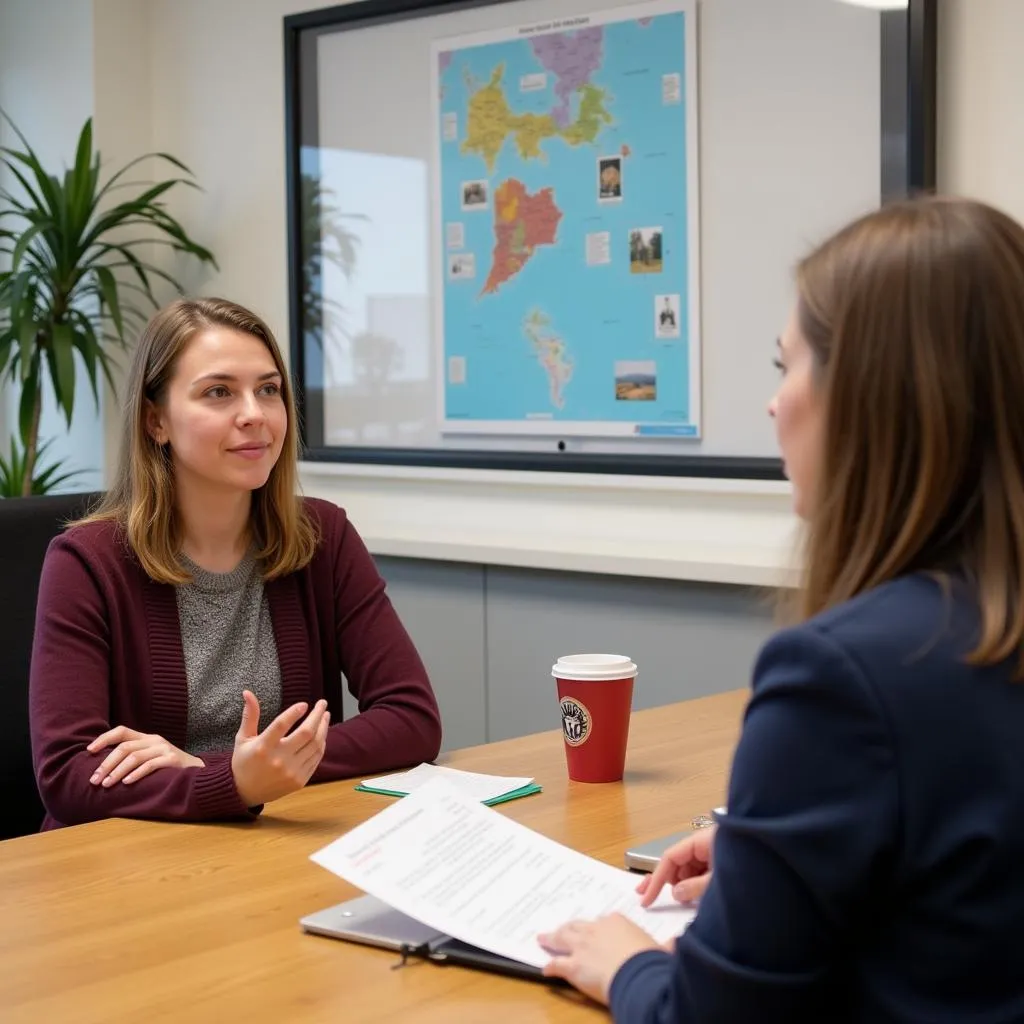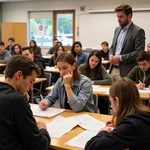Describing a memorable journey is a common topic in IELTS Speaking tests. This theme allows candidates to showcase their vocabulary, fluency, and ability to narrate personal experiences. In this article, we’ll explore effective strategies to excel in this topic, providing sample answers for different band scores and essential tips from an experienced IELTS examiner.
Part 1: Introduction and Interview
In the first part of the IELTS Speaking test, you may encounter questions related to travel and journeys. Here are some common questions and a sample answer:
- Do you like travelling?
- What kind of places do you like to visit?
- Do you prefer to travel alone or with others?
Let’s focus on the third question:
Sample answer (Band 7-8):
“I generally prefer to travel with others, especially close friends or family members. There’s something special about sharing new experiences and creating memories together. However, I can also appreciate the benefits of solo travel, such as the freedom to plan your itinerary without compromise and the opportunity for self-reflection. It really depends on the purpose of the trip and my mood at the time.”
Describe a person who has influenced your personal development can be another interesting topic to explore in your IELTS Speaking preparation.
Part 2: Long Turn
Here’s a sample cue card related to describing a journey:
Describe a journey that you remember well
You should say:
- Where you went
- How you travelled
- Who you went with
- Why you remember this journey
Sample answer (Band 6-7):
“I’d like to talk about a memorable journey I took to Bali, Indonesia, last summer. I travelled there by plane with my best friend, Sarah. We decided to go on this trip to celebrate our graduation from university.
The journey stands out in my memory because it was my first time visiting a tropical island. We spent a week exploring beautiful beaches, lush rice terraces, and ancient temples. One of the highlights was watching the sunrise from the top of Mount Batur, which we climbed early one morning.
What made this journey unforgettable was the combination of breathtaking scenery, delicious local food, and the warm hospitality of the Balinese people. It was also special because I got to share these experiences with my close friend.
Overall, this trip to Bali was a perfect way to mark the end of our university years and the beginning of a new chapter in our lives. The memories we created during this journey will stay with me for a long time.”
Sample answer (Band 8-9):
“I’d like to recount a profoundly memorable journey I embarked on to the Camino de Santiago in Spain last year. This pilgrimage route, also known as the Way of St. James, is a network of paths leading to the shrine of the apostle Saint James the Great in Santiago de Compostela.
I undertook this journey primarily on foot, covering approximately 780 kilometers over the course of a month. While I began the pilgrimage solo, I found myself forging deep connections with fellow pilgrims from various corners of the globe along the way.
This journey remains etched in my memory for several compelling reasons. Firstly, the physical challenge of walking such a vast distance pushed me to my limits, teaching me valuable lessons about perseverance and self-reliance. Secondly, the cultural immersion was unparalleled – I had the opportunity to traverse picturesque Spanish villages, sample authentic regional cuisines, and engage with locals, all of which provided a rich tapestry of experiences.
Moreover, the spiritual aspect of the Camino was profoundly impactful. Regardless of one’s religious beliefs, the path offers ample time for introspection and self-discovery. I found myself contemplating life’s big questions and gaining fresh perspectives on my personal goals and values.
Perhaps most significantly, the sense of camaraderie among pilgrims was extraordinary. Despite our diverse backgrounds, we were united by a common purpose, which fostered a unique bond. The conversations and shared experiences with these individuals from all walks of life were both enlightening and heartwarming.
In essence, this journey along the Camino de Santiago was far more than a mere trip; it was a transformative experience that challenged me physically, enriched me culturally, and nourished me spiritually. The memories and insights gained during this pilgrimage continue to influence my outlook on life, making it truly unforgettable.”
 Pilgrims walking on the Camino de Santiago
Pilgrims walking on the Camino de Santiago
Follow-up questions:
- What did you learn from this journey?
- Would you recommend this journey to others? Why or why not?
Sample answer (Band 8-9):
“This journey was incredibly enlightening on multiple levels. I learned the importance of resilience in the face of physical challenges, as well as the value of living in the present moment. The Camino taught me to appreciate simple pleasures and to find joy in the journey itself, rather than fixating solely on the destination.
I would wholeheartedly recommend this journey to others, with the caveat that it requires proper preparation and an open mind. The Camino offers a unique opportunity for self-reflection and personal growth that is hard to find in our fast-paced modern world. It allows you to disconnect from daily stresses and reconnect with yourself and others in a meaningful way. Moreover, the cultural and historical richness of the route provides an educational experience that goes beyond typical tourism. However, it’s important to note that the journey can be physically demanding and may not suit everyone’s preferences or capabilities.”
Describe a time when you worked hard to achieve something is another topic that can help you prepare for diverse IELTS Speaking scenarios.
Part 3: Two-way Discussion
In this part, the examiner will ask more abstract questions related to the topic of journeys and travel. Here are some possible questions and sample answers:
- How have methods of travel changed in recent years?
- What are the advantages and disadvantages of tourism for local communities?
- Do you think travel is necessary for a good education?
Let’s focus on the third question:
Sample answer (Band 7-8):
“I believe that travel can be an invaluable component of a good education, although it’s not necessarily essential for everyone. Travel exposes us to different cultures, perspectives, and ways of life, which can broaden our horizons in ways that traditional classroom learning often can’t.
When we travel, we encounter real-world applications of the subjects we study, whether it’s history, geography, or foreign languages. This hands-on experience can reinforce and deepen our understanding of these subjects. Moreover, travel often challenges our preconceptions and comfort zones, fostering personal growth and developing important life skills such as adaptability, problem-solving, and cross-cultural communication.
However, it’s important to acknowledge that not everyone has the opportunity to travel extensively due to financial or other constraints. Fortunately, in today’s digital age, there are alternative ways to gain global exposure, such as virtual tours, international exchanges, or engaging with diverse communities within one’s own country.
In conclusion, while travel can significantly enhance education by providing immersive, real-world learning experiences, it’s not the only path to a well-rounded education. The key is to cultivate curiosity about the world and seek out diverse perspectives, whether through physical travel or other means.”
Sample answer (Band 8-9):
“The question of whether travel is necessary for a good education is multifaceted and warrants careful consideration. While I believe that travel can substantially enrich one’s educational experience, I wouldn’t go so far as to say it’s absolutely necessary for everyone.
Travel, undoubtedly, offers a unique form of experiential learning that can complement and enhance formal education. It provides firsthand exposure to different cultures, histories, and social systems, allowing individuals to gain a more nuanced understanding of global issues and diverse perspectives. This kind of immersive experience can foster cultural sensitivity, adaptability, and critical thinking skills that are invaluable in our increasingly interconnected world.
Moreover, travel often presents challenges that require problem-solving, resourcefulness, and self-reliance – all of which are crucial life skills. The act of navigating unfamiliar environments can boost confidence and independence, contributing significantly to personal growth and development.
However, it’s crucial to acknowledge that high-quality education can be achieved through various means. In the digital age, virtual experiences, cross-cultural exchanges, and diverse local communities can provide some of the benefits traditionally associated with travel. Furthermore, extensive reading, engaging with diverse media, and participating in multicultural events can also broaden one’s horizons.
It’s also worth noting that the educational value of travel largely depends on the traveler’s mindset and approach. Merely visiting different places without meaningful engagement or reflection may not contribute significantly to one’s education.
In conclusion, while travel can be an exceptionally powerful educational tool, it’s not an absolute prerequisite for a good education. The essence of a quality education lies in fostering curiosity, critical thinking, and a global perspective – which can be nurtured through various means, including but not limited to travel. The key is to remain open-minded, seek diverse experiences, and continuously challenge one’s own assumptions and worldviews.”
 Students exploring historical site during educational trip
Students exploring historical site during educational trip
Key Vocabulary and Phrases for High Scores
To enhance your speaking performance, incorporate these advanced vocabulary items and phrases:
-
Embark on a journey /ɪmˈbɑːk ɒn ə ˈdʒɜːni/ (phrasal verb): To start a trip or new experience.
Example: “I embarked on a journey of self-discovery through Southeast Asia.” -
Wanderlust /ˈwɒndəlʌst/ (noun): A strong desire to travel.
Example: “My wanderlust led me to explore remote corners of the globe.” -
Off the beaten track /ɒf ðə ˈbiːtn træk/ (idiom): Describing a place that is remote and not frequently visited by tourists.
Example: “We prefer to visit destinations that are off the beaten track.” -
Broaden one’s horizons /ˈbrɔːdn wʌnz həˈraɪznz/ (idiom): To expand one’s knowledge, experience, or outlook.
Example: “Traveling to different countries has really broadened my horizons.” -
Immerse oneself /ɪˈmɜːs wʌnˈself/ (phrasal verb): To become completely involved in something.
Example: “I tried to immerse myself in the local culture during my stay.”
Describe an online shopping experience you enjoyed can provide useful language practice for discussing modern experiences in your IELTS Speaking test.
Examiner’s Advice
To excel in the IELTS Speaking test when describing a journey:
-
Prepare a range of personal experiences: Have several journeys in mind to discuss, varying in length, purpose, and destination.
-
Practice descriptive language: Use vivid adjectives and sensory details to bring your journey to life.
-
Structure your answer: Organize your thoughts logically, covering all points in the cue card.
-
Show reflection: Demonstrate how the journey impacted you or what you learned from it.
-
Use a variety of tenses: Incorporate past, present, and future tenses appropriately to showcase your grammatical range.
-
Develop your ideas: In Part 3, try to give extended answers with examples and explanations to support your points.
-
Stay relevant: While it’s good to elaborate, ensure your answers remain focused on the question asked.
Remember, the key to success in IELTS Speaking is not just about perfect grammar or extensive vocabulary, but about communicating effectively and confidently. Regular practice with a variety of topics will help you achieve this goal.
Describe something you are proud of achieving is another excellent topic to practice for your IELTS Speaking preparation, allowing you to showcase personal experiences and reflections.
 IELTS candidate practicing speaking skills
IELTS candidate practicing speaking skills
By following these strategies and incorporating advanced vocabulary, you’ll be well-prepared to describe memorable journeys in your IELTS Speaking test. Remember, the goal is not just to recount events, but to engage your listener with a well-structured, reflective, and linguistically rich narrative. Good luck with your IELTS preparation!
Describe an interesting place you visited recently offers another opportunity to practice describing travel experiences for your IELTS Speaking test.


